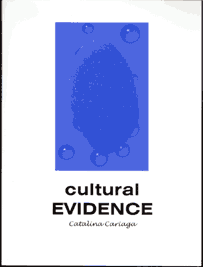Catalina Cariaga, 'Cultural Evidence' (Subpress Collective, 1999)
Of course
they didn't eat dogs.
They didn't have dogs.
If they had dogs
they would have eaten them.
--Catalina Cariaga
This poem, "Dogmeat," is one of the opening poems to Catalina Cariaga's Cultural Evidence (Subpress Collective). I really can't think of a better way to start off a collection of poetry concerned with weighing the given anthropological, journalistic, statistical evidence of Filipinos in the world, versus evidence provided via experiential knowledge and memory. Right away, Cariaga is telling folks, don't readily believe everything you've been told about us.

Consistent throughout Cultural Evidence is the necessity of speaking for oneself, and the silencing and objectification which occurs when others claim to speak for you. The poem, "No Tasaday," is about the fake Philippine tribe, allegedly perfectly peaceful ("no word for 'war'," "vegetarian scavengers,") and pure ("no smallpox, no yellow fever") stone-agers living in a remote Philippine rain forest in the twentieth century. Many things about the invention of the Tasaday were unfortunate:
"Nothing is more gentle than man in his primitive state," wrote French philosopher Jean Jacques Rousseau. His theory about the human condition seems borne our by this Tasaday child and his defenseless kin, who must now depend on the protection of 20th Century man for their very survival as a people.
-- photo caption, "Stone Age Cavemen of Mindanao," National Geographic (1972)
Cariaga creates for us a picture of these gentle and pure primitives in jarring, one-word/phrase lines: "Breasts / monogamous // primitive / gentle / horror / bliss," "Napalm / rain // Viet Cong / Tasaday," "savage / child / jungle / rain forest / 1972 / 1492 / fierce / genteel // genitals / thighs // Real / distant."
Western contact with the natives and the constructed image of the primitive during the Age of Imperialism is not too different from Western contact with the natives and the constructed image of the primitive in the twentieth century, with the constructed image of the primitive leading to a rationale of paternalism and conquest. Humanity is blurred until it's nonexistent.
Similarly, in "Excerpts from Bahala Na!" her speaker sifts through so much noise, television commercials, sound bytes and chatter, trying to find out something substantive about Flor Contemplación, the Filipina Overseas Contract Worker (OCW) in Singapore; she was framed for two murders, including the child of the family for whom she worked as the maid. She was subsequently executed by hanging in 1995. The poem is a series of couplets which are comprised of other people's words:
52.
"All around the world" "diapers and baby food"
"Lysol, Clorox, and Ivory" "another Filipina maid""Singapore girl" "Playtex and Gerber"
"the four-year old boy" "declined to testify""All around the world" "a domestic" "she" "was represented"
"with clemency, but this was rejected" "please E-mail me""Singapore girl" "because 'voices told her to do it'"
"a Professor of anthropology and folklore" "found untrue""All around the world" "and then, new versions came out"
"Roosters with blades connected" "die a quick death"
Here, the poetic speaker's plea for someone to email her with information regarding Flor Contemplación is drowned out by the Singapore Airlines jingle, news reports that don't tell her anything insightful or humanizing, the anthropologist Alan Dundes's research on the Southeast Asian cockfight, brand names of products and commodities. Contemplación is a commodity moved between seller, distributor, and buyer. We never hear her voice.
"Cocks are symbolic," wrote Dundes, as Cariaga epigraphs for "Excerpts from Bahala Na!" Cocks are bred for one thing only, to do as their owners have trained them to do up until their dying breath, as the Filipina has become used as one thing transnationally --
"Singapore girl" "a vacuum cleaner and oven" "cooks"
"a domestic" "bred and raised for such purposes"
As an OCW, Contemplación was a member of a silenced and self-replenishing labor force when one should expire. Cultural Evidence ends with this poem, and her final couplet is the plea:
"Please E-mail me."
"Please E-mail me."
This is a call for dialogue. Don't speak for us. Speak to us. And hear us.
Barbara Jane Reyes was born in Manila, the Philippines, and grew up in the San Francisco Bay area. She...
Read Full Biography

